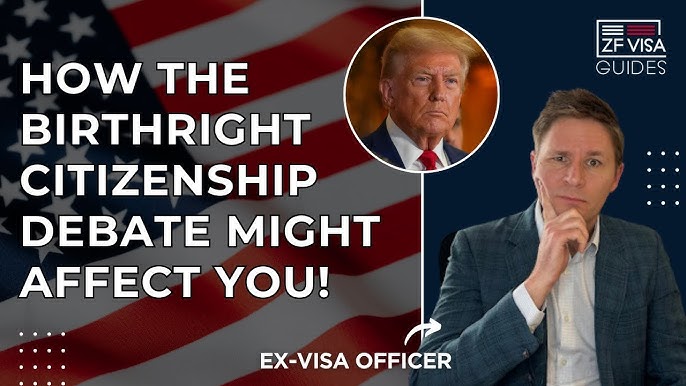President Donald Trump’s executive order terminating birthright citizenship is currently under examination by U.S. District Judge John Coughenour in Seattle. This directive aims to revoke citizenship for children whose parents are illegally in the United States at the time of their birth. A debate is scheduled involving representatives from the Trump administration as well as legal representatives from four states and an immigrant rights organization contesting the order.
This examination follows closely on the heels of a similar proceeding. A Maryland federal judge ordered a nationwide halt in a case revolving around the rights of immigrants and expectant mothers whose imminent offspring could potentially be influenced by the order.
President Trump’s executive order is designed to put a stop to what has been considered automatic citizenship bestowed upon children born on U.S. soil to parents who are illegally present in the country or are temporary residents such as visitors with student or tourist visas.
Currently there is a hold on this initiative. Recently, Coughenour referred to the executive order as ‘clearly unconstitutional.’ Following this claim, Coughenour established a 14-day provisional restraining order blocking its initiation.
Last Wednesday, U.S. District Judge Deborah Boardman decided to maintain the order on hold as a longer-term solution, until a definitive ruling on the case is made. This situation is contingent on a successful appeal being raised by the Trump administration.
The issue of birthright citizenship was back under the scrutiny of Judge Coughenour last Thursday. In a hearing last month, he commented that this case was particularly unique in his over forty years serving as a federal judge.
During the expiring of his provisional order blocking the action, he will listen to arguments relating to whether an injunction similar to the one provided by the Maryland judge should be issued.
This national issue has brought together 22 states, as well as several organizations that have undertaken lawsuits to curb the executive action. The case overseen by the Seattle judge on Thursday includes four states: Arizona, Illinois, Oregon, and Washington. The Northwest Immigrant Rights Project has also joined the cause, bringing another lawsuit into the issue.
On the other side, eighteen states led by Iowa have submitted a ‘friend-of-the-court’ brief in support of the administration’s stance on the case. Another hearing will take place on Friday in a Massachusetts court, showcasing a different coalition of 18 states challenging the order, with New Jersey in the lead.
Central to the lawsuits is the 14th Amendment to the Constitution, ratified after the Civil War in 1868. The claimants argue that the amendment unequivocally grants citizenship to ‘all persons born or naturalized in the United States and subject to the jurisdiction thereof, are citizens of the United States and the state wherein they reside.’
Although the administration contends that offspring of noncitizens are not ‘subject to the jurisdiction’ of the United States, and hence not entitled to citizenship, it’s clear that there is a legal disagreement over the interpretation of the constitutional text.
Traditionally, certain exceptions have been acknowledged where children do not automatically gain U.S. citizenship upon being born on U.S. soil. These include children of diplomats, enemy combatants during hostile occupation, those born on foreign ships, and members of autonomous Native American tribes.
The U.S. is a part of a group of around 30 countries that apply the principle of jus soli or ‘right of the soil,’ conferring birthright citizenship. The majority of these countries are located in the Americas, including Canada and Mexico.
This order from President Trump, which presents a bold new path, is yet another testament to his administration’s dedication to tackling illegal immigration and boundary issues. While the legal debate continues, it’s clear that the Trump administration’s determination remains unfaltering.


